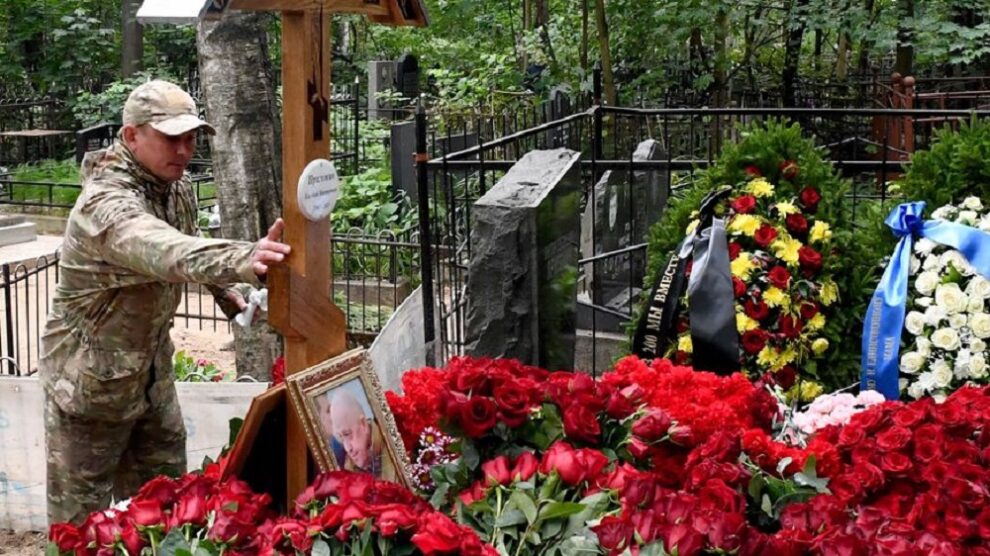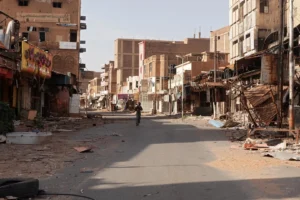A senior defense official visited eastern Libya to meet with the Libyan National Army and assure them that Russian support would continue.
On Aug. 22, a day prior to the plane crash that claimed the life of Yevgeny Prigozhin, Russia’s Deputy Defense Minister Yunus-Bek Yevkurov paid a visit to Benghazi.
Yevkurov’s visit included a meeting with Khalifa Hifter, the commander of the Libyan National Army (LNA), in the company of high-ranking LNA officers.
The timing of the visit, nearly two months after Prigozhin’s Wagner Group rebelled against Russia’s military establishment, was partially to reassure the LNA about the Kremlin’s standing and control over the mercenary force.
The short-lived mutiny by Wagner in Russia, followed by Prigozhin’s demise, put the future of the private military contractor and its operations outside of Russia under the spotlight. There has been much speculation about how the events in Russia would influence the group’s current active operations in Africa, including in Libya. A senior Wagner delegation was sent to Benghazi in July following the mutiny to assure the LNA’s leadership that there would be no change in their operations.
According to Libyan and foreign sources, senior Wagner figures have visited eastern Libya three times this year at crucial junctures. The Russians first visited in February after CIA Director William Burns’ January visit to Libya. Their second meeting in April occurred after US Assistant Secretary of State Barbara Leaf’s visit to Benghazi. Finally, Wagner quickly came after the late June mutiny in Russia. The visits were a mix of assurances, warnings and demands for payments.
Difficult relation from the start
The relationship between the LNA’s leadership and Wagner’s top brass was difficult from the start and has grown even more difficult over time. Disagreements include payments owed by the LNA to Wagner and Wagner’s failed attempts to secure official contracts in various sectors including mining, energy, telecommunications and construction. The sides also disagreed on Wagner’s lack of coordination with the LNA, including the type of weapons systems imported to Libya and the number of fighters brought in and out of the country.
The Wagner units in Libya were able to secure funding by using Libya as a hub for some of their illicit operations including drugs, fuel smuggling, human trafficking, and illegal mining activities in the Fezzan. For those illicit activities, the Wagner Group relies greatly on their cross-border networks and connections with local communities and armed groups that they have developed over the years.
Senior LNA officers, including Hifter, appreciated Yevkurov’s visit to Benghazi as a sign that Moscow is willing to upgrade its level of official engagement, after years of leaving that to the Wagner Group. According to LNA sources, Yevkurov discussed the future of Moscow and Benghazi’s relationships, and in particular their military and security cooperation.
Since Hifter walked out on the Russians in January 2020 without signing a cease-fire agreement brokered by Russia and Turkey, the Russian government chose to downgrade their relationship, leaving him to deal with the difficult Wagner Group leadership.
Russia’s assurances
The LNA’s sources indicated that the deputy minister of defense said that the Russian Ministry of Defense will now oversee Moscow’s engagement with them. This will include managing current training missions in Libya as well as the operation and maintenance of advanced Russian-made weapons systems. However, the sources could not confirm whether that will entail an official cooperation agreement, or a new private military contractor directly managed by the ministry.
There has been chatter about Russia setting up a naval presence in the eastern city of Tobruk. However, LNA sources have denied that the LNA is currently engaged in any such conversations with the Russian government. Nonetheless, the same sources indicated that Russian naval vessels might stop by eastern seaports in the future, similar to stops made in 2015 and 2016, and similar to what the Turkish navy does in ports in western Libya. They also indicated that while such dockings could happen, full naval presence for Russia in Tobruk was categorically denied — at least at this stage.
Russia is certain to maintain its military footprint in Libya, albeit with some leadership changes. For the LNA, Russia is an important counterbalance to Turkey’s solidifying military presence in western Libya, especially since the US government is unable to offer the LNA guarantees that Turkey would leave if the Russians depart Libya, or offer the LNA an alternative that could provide it with services akin to Wagner’s. These very specific issues have repeatedly been brought up by Hifter with senior US government officials.
Source : Al-Monitor











Add Comment